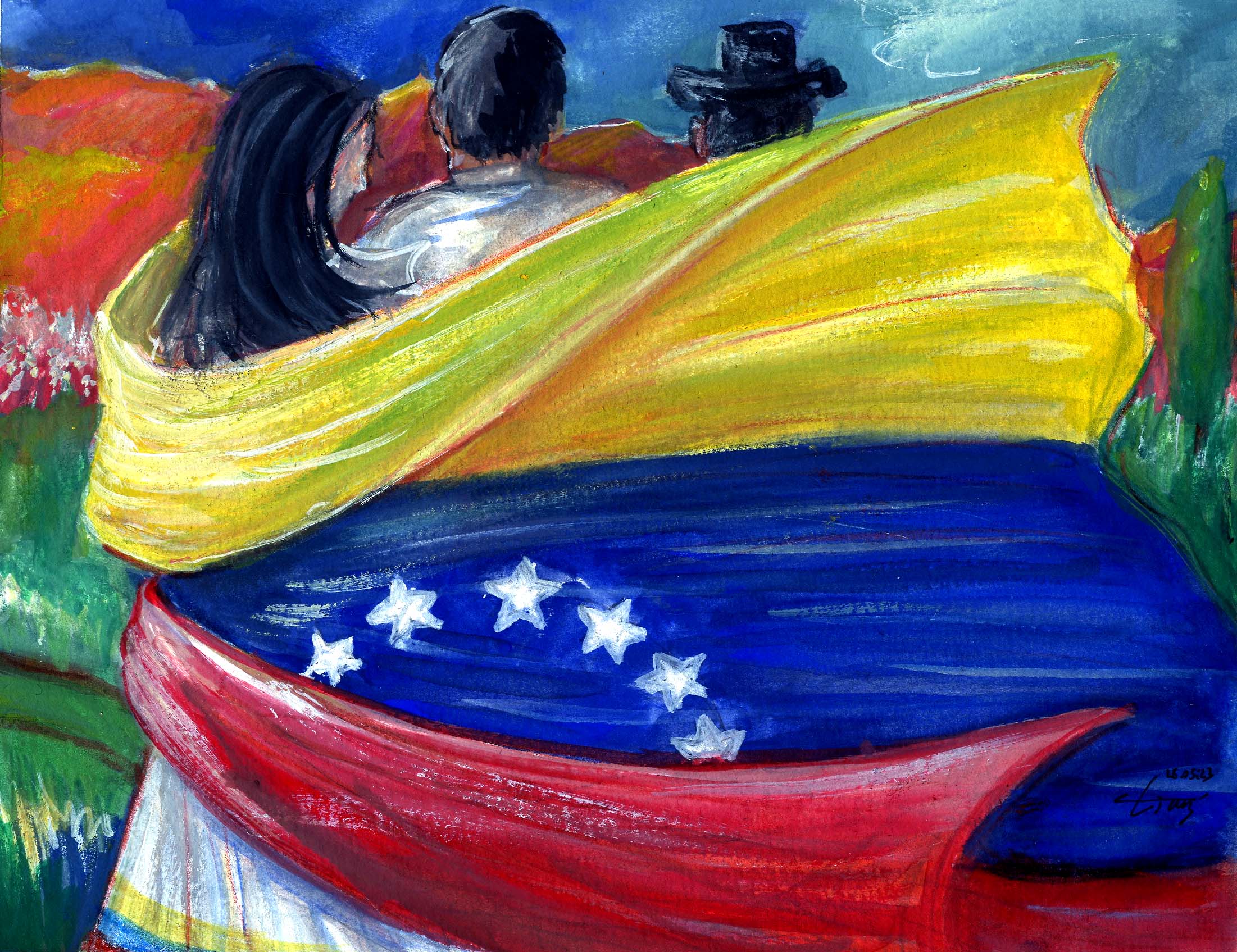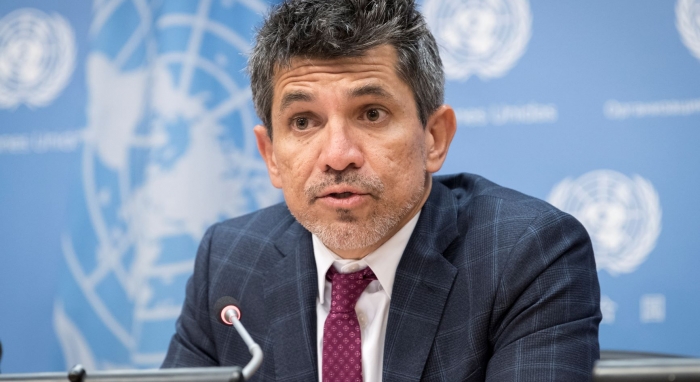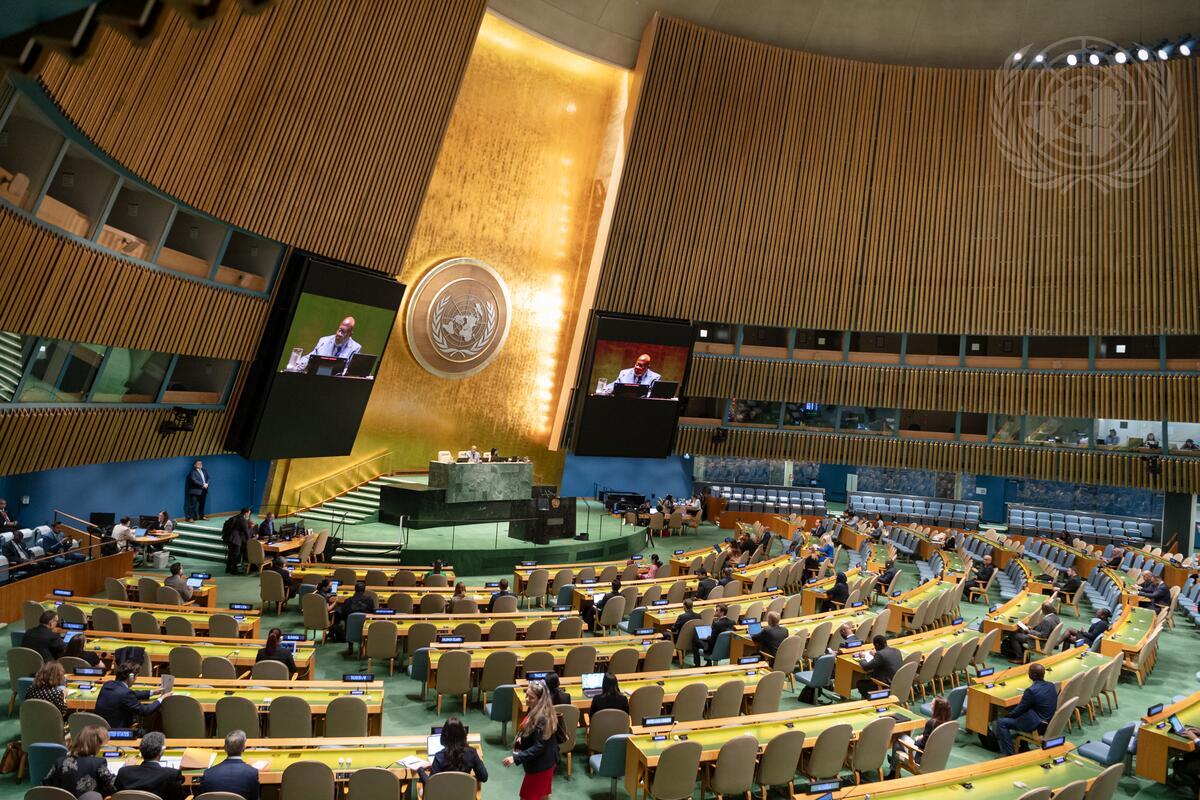An ILGA and ISHR analysis shows that over the past year the thematic UN Special Procedures have consistently pushed for better protection of the human rights of LGBTI persons. The observation follows an update of ILGA & ISHR’s series of factsheets, which list the references and recommendations made regarding LGBTI persons and SOGIESC in communications, thematic reports and country visits by mandate holders. In addition to the 34 mandates who had already made progress in terms of addressing SOGIESC since 2011, three new Special Procedures – the Independent Expert on albinism, the Special Rapporteur on the right to food and the Working Group on the use of mercenaries – started to include LGBTI issues in their activities.
Overall, in relation to LGBTI topics, the thematic Special Procedures sent 29 new communications,[1] issued 31 reports on country visits and published 34 thematic reports.
We welcome the ongoing attention that these experts are paying to SOGIESC human rights issues, including particular attention to the situation of LGBTI activists and growing recognition of intersectional problems, such as those of LGBTI migrants/refugees. At the same time, we encourage the mandate holders to strength their analysis of specific populations within LGBTI communities, such as LBQ women, trans or intersex persons, and to look into the situation of LGBTI persons who are not necessarily activists.
Find out more about the trends in 2019 below! You can find the updated factsheets here.
Which experts include LGBTI issues most regularly?
The mandates that made the most regular references to SOGIESC issues were:
- the Independent Expert on SOGI (30 items, i.e. 30 SOGIESC-inclusive thematic reports, country reports or communications on LGBTI topics),
- the Special Rapporteur on human rights defenders (20 items);
- the Special Rapporteur on freedom of expression (18 items);
- the Working Group on discrimination against women (16 items);
- the Special Rapporteur on torture (11 items);
- the Special Rapporteur on violence against women (11 items);
- the Special Rapporteur on freedom of peaceful assembly and of association (10 items); and
- the Special Rapporteur on health (10 items).
-
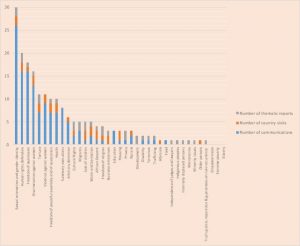
2019 SOGIESC thematic reports, country visits and communications by mandates
Which parts of the world are getting most attention?
Geographically, the mandates of Special Procedures cover all the parts of the world, and they made SOGIESC-inclusive communications or country reports on states from all five UN geographical clusters.
Taking into account the local situations and regional trends, this distribution is generally balanced. The highest number of references were made on countries from the Asia-Pacific Group (15 items), followed by the African Group (13 items), the Latin American and Caribbean Group – GRULAC (12 items), the Eastern European Group – EEG (10 items), and then the Western European and Others Group – WEOG with only 8 items.
-
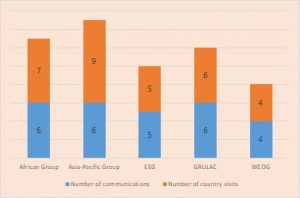
2019 SOGIESC communications and country visits – According to UN regions
Communications
29 new communications on SOGIESC – letters concerning allegations of human rights violations – were sent by thematic mandates for the period from 1 June 2018 to 31 May 2019 and published in three Human Rights Council (HRC) reports in 2019.
The vast majority of the communications (26) were made with the Independent expert on SOGI. The other top three mandates were the Special Rapporteur on human rights defenders and the Special Rapporteur on freedom of expression (16 communications each), and the Working Group on discrimination against women (13 communications). In a welcome advance, five mandates (food, sale of children, counter-terrorism, trafficking, and water and sanitation) made their first communications covering LGBTI topics.
Communications covering SOGIESC issues were sent to 21 states in all regions: Armenia, Brazil, Brunei Darussalam, Canada, Egypt, Guatemala, Honduras, Hungary, Indonesia, Kazakhstan, Kenya, Lebanon, Malaysia, Mauritius, Peru, Romania, Russian Federations, Tanzania, Tunisia, Turkey, and the United States of America.
-
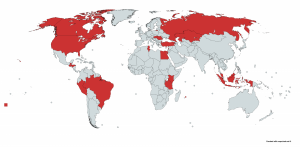
Countries that received communications
While most of the communications were addressed to states, one was sent to the UN Refugee Agency – UNHCR, and another to the International Association of Athletics Federations – IAAF.
When it comes to specific populations and topics, the vast majority of communications were related to the situation of LGBTI human rights defenders and challenges they face due to their activities. Some communications went beyond this important area, and examined other areas of human rights where LGBTI face challenges.
Only one communication concerned intersex persons specifically. Three communications referred to discrimination and violence against LGBTI migrants or refugees, and two communications raised the problem of criminalisation of consensual same-sex sexual acts. Four communications addressed limitations on dissemination of SOGIESC-related information, particularly in education.
Country Visits
In 31 reports on visits thematic mandates made to 25 different countries, the Special Procedures referred to LGBTI issues.
-
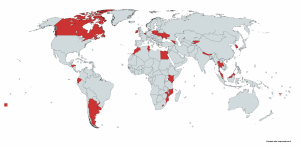
Country visit reports published
The countries are in all regions: Argentina, Armenia, Belgium, Bhutan, Canada, Ecuador, Egypt, Fiji, Georgia, Honduras, Ireland, Kenya, Kyrgyzstan, Lesotho, Malaysia, Morocco, Mozambique, Nepal, Poland, Republic of Korea, Republic of Moldova, Thailand, Tunisia, Ukraine, and Uruguay.
Thematic Reports
Special Procedures also included SOGIESC elements in their thematic reports to the Human Rights Council and General Assembly. 34 reports (almost 50% of all the thematic reports presented in 2019) mentioned at least some LGBTI topics, with 11 of these reports – set out in the table below – including good or strong references to LGBTI populations.
2019 Thematic reports with good or strong SOGIESC references
| Mandate |
Report Topic |
References |
| Cultural Rights |
Importance of public spaces for the exercise of cultural rights |
Good references to LGBTI & gender-diverse persons (need for public authorities to ensure protection from shaming, exclusion and abuse in public spaces, including by changing discriminatory attitudes). |
| Discrimination against women |
Women deprived of liberty |
Good reference to SGE, SOGI, “sexual and gender non-conforming women”, “sexual and gender minorities”, transgender women and sexuality (higher risks due to intersectionality; institutionalization and “conversion therapies”; criminalisation and deprivation of liberty, police profiling and targeting of trans sex workers; a recommendation to ban laws and practices policing, targeting, punishing or confining women in relation to consensual sexual behaviour or decisions, including expressions of sexuality). |
| Freedom of peaceful assembly and association |
Rights to freedom of peaceful assembly and of association in the digital age |
Good reference to LGBTI (risks and different forms of violations faced by LGBTI persons in relation to internet and mobile apps; examples of protective measures adopted by online platforms). |
| Human rights defenders |
Impunity for human rights violations against human rights defenders |
Good reference to LGBTI and SOGI (differentiated and intersectional approach recognizing that certain peoples, groups or individuals need different levels of protection owing to specific situations of clear vulnerability). |
| Migrants |
Impact of migration on migrant women and girls |
Good reference to LGBTI and SO (Specific challenges faced by migrant women belonging to the LGBTI community). |
| Privacy |
Security and surveillance; privacy and gender; health data protection |
Good reference to SOGIESC, LGBTQI, LGB and intersex (SOGI as covered by the concept of privacy in the HRCtee’s practice; LGBTQI and internet; surgeries towards intersex children as a privacy intrusion; image-based abused experienced by LGB; reference to YP+10). |
| SOGI |
Socio-cultural and economic inclusion |
The whole report |
| SOGI |
Data collection and management as a means to create heightened awareness of violence and discrimination based on SOGI |
The whole report |
| Torture |
Relevance of the prohibition of torture and other cruel, inhuman or degrading treatment or punishment to domestic violence |
Good reference to SOGIESC and SO (“honour crimes”, “conversion therapy”, “reparative therapy”). |
| Water and Sanitation |
Human rights to water and sanitation in spheres of life beyond the household with an emphasis on public spaces |
Strong references to transgender persons, LGBTI and GI (lack of access outside the household leading to economic and social disempowerment of marginalized groups, particularly LGBTI persons, particular experiences of trans persons, considering needs of women and transgender persons in design of water and sanitation facilities in public spaces). |
[1] Communications published in HRC reports in 2019 (which are communications sent between 1 June 2018 and 31 May 2019). The updated factsheets, however, include information on those communications which have been published between January 2011 and October 2019.
